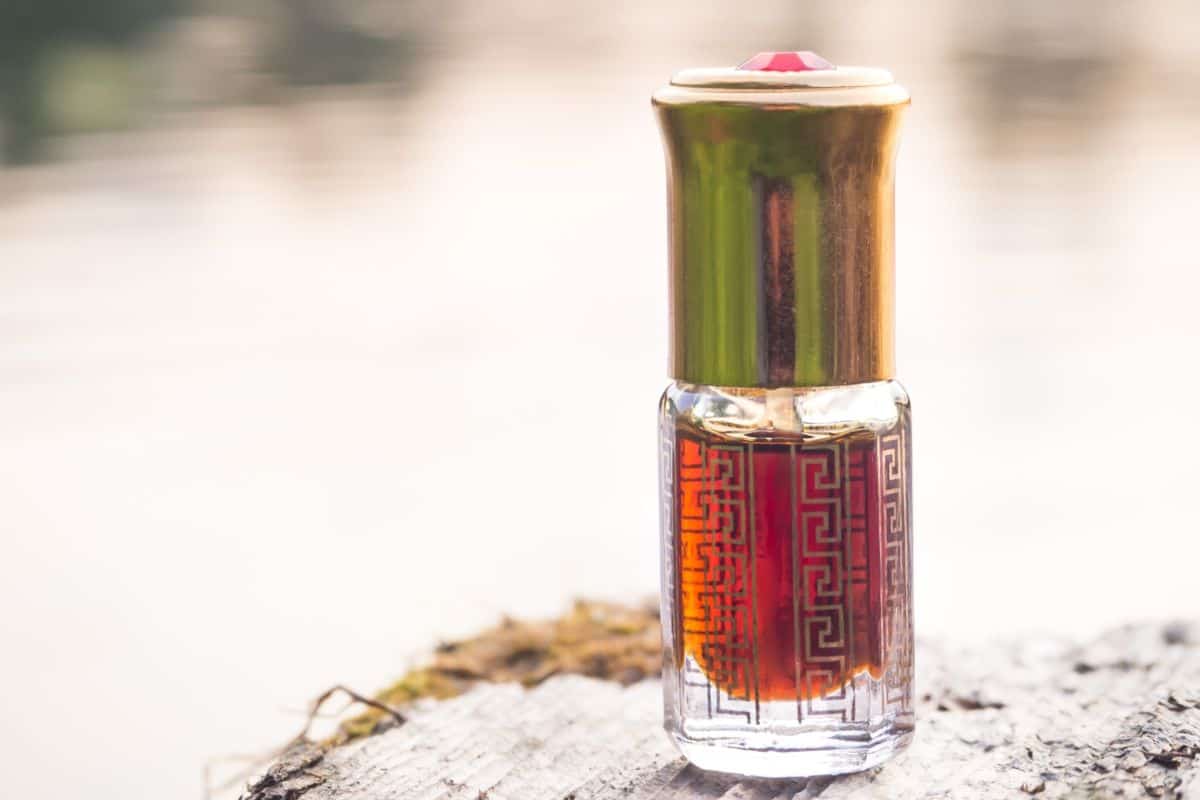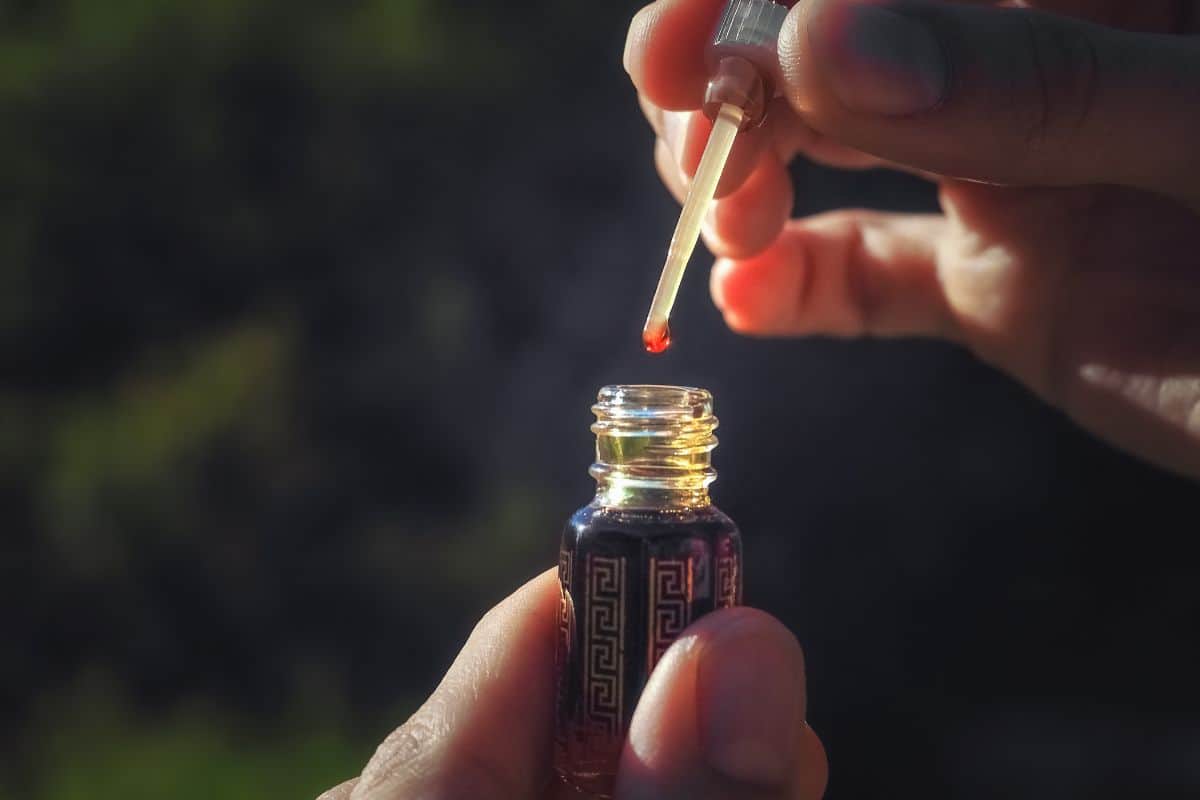Patchouli is a strong, musky-smelling plant that has seen a huge rise in popularity in recent years. It is known for its woody, earthy fragrance and can most commonly be found in the form of incense, essential oils, and soap.

It is especially popular among the new-age and western spiritual communities because of its natural healing properties. It is especially popular in its oil form.
But what is patchouli oil and what does it actually smell like? In this article, we will be going over everything you need to know about patchouli oil.
What Is Patchouli Oil?
Whereas patchouli in its raw form comes from the patchouli plant in the form of leaves, patchouli oil is taken from those leaves but dried and broken down into oil form.
It is an essential oil that is harvested from the patchouli plant via the leaves being dried out and then distilled. During the distillation process, the oil is extracted from the dried patchouli leaves.
What Does Patchouli Oil Smell Like?
Patchouli oil is described as being robust, with a “woody fragrance”. It is very earthy and musky, with both a spicey and sweet undertone.
Though lots of people love the smell of patchouli, there are some who aren’t too fond of it. Not because it does not smell good, but because it is such a strong scent.
It can be quite overwhelming to the senses and in some cases, patchouli has a bit of a stigma attached to it because it is heavily stereotyped as being connected to the “hippie” culture and lots of people seem to think of that culture as negative (which it isn’t!).
But those who do love the smell of patchouli oil love the earthy and musky tones of the scent. It is extremely herby and great for anyone who loves strong fragrances that remind them of the natural earth.
What Is Patchouli Oil Used For?
Patchouli oil is used for a number of different things. One of the main uses of patchouli oil is for health benefits, but we’ll be going into better detail about that later!
Patchouli oil is also used for aromatherapy, believed to help with depression, anxiety, and stress. It is one of the more popular scents that is used and requested in aromatherapy sessions.
It is also great for keeping insects at bay and away from you, so if you spend a lot of time outdoors, using some patchouli oil around you and on appropriate parts of your skin can repel insects that are prone to biting!
There are so many benefits to using patchouli oil, but you do have to make sure that you test it on your skin first. Some people find that they don’t react well to patchouli oil, and can get rashes or bad reactions to it.
Just give yourself a patch test with the oil and then wait 24 hours to make sure that you don’t have any adverse reactions or effects to it.
If you do, you can use patchouli in other ways, such as soap or incense, so if the oil is too much for you, there are alternatives you can try!
Health Benefits Of Patchouli Oil

Now we can talk about the health benefits provided by patchouli oil. The health benefits are one of the major reasons so many people use and love patchouli oil, so if you’re considering getting some for yourself, here are some of the benefits you can look forward to.
Anti-inflammatory
Patchouli oil is well known for its anti-inflammatory properties. It helps to bring swelling down and serves as a natural anti-inflammatory agent. It also helps bring swelling down for your joints and wounds. Think of it in a way as nature’s answer to ibuprofen!
Pain Relief
Similar to anti-inflammatory properties, patchouli oil is also great for pain relief. Researchers currently believe that pain relief works hand in hand with the anti-inflammatory properties of the patchouli plant.
Some of the great ways patchouli helps with pain relief include muscle spasms, sore muscles, and arthritic conditions.
Anti Bacterial
Patchouli oil is also very antibacterial, repelling bacteria from entering wounds and preventing infection.
If you have healing wounds that you’re worried are going to get infected, you can apply a small amount of patchouli oil to the area. Do not go overboard though and don’t apply any oil to an open wound.
Anti Fungal
On top of all the other benefits of patchouli oil, it is also Anti Fungal and can prevent fungal infections.
Mental Health Benefits
As previously mentioned in this article, patchouli oil is used in aromatherapy to reduce stress and help with depression. It has a very calming effect on the body and mind when it is inhaled, allowing you to mentally benefit from patchouli as well as physically.
Anti Aging
Patchouli is also a great anti-aging agent. It keeps the skin loose and also keeps pimples and blemishes at bay thanks to its anti-bacterial properties.
It helps wounds to heal faster, helps your skin when it comes to healing scar tissue, and slows down the process of wrinkles forming. Overall, patchouli oil just helps with keeping your skin looking and feel young and fresh.
As you can see, there are many health benefits to patchouli oil which make it a great essential oil to keep on your person, especially if you are looking for a more natural approach to healing. Always make sure to check that your skin works with it though.
If you break out in any rashes or have any irritation, stop using it immediately!
Conclusion
The earthy and musky scent of patchouli is a great oil to have in your collection, especially if you love your stronger fragrances.
Besides just smelling woody with wonderful sweet and spicy hints, patchouli oil is also incredibly beneficial to your health and wellbeing, making it the perfect essential oil to keep in your inventory.
If you love strong, earthy scents and want something close by that will benefit you physically, then patchouli oil is the perfect essential oil for you to try!
All product names, logos, brands, and trademarks are the property of their respective owners
